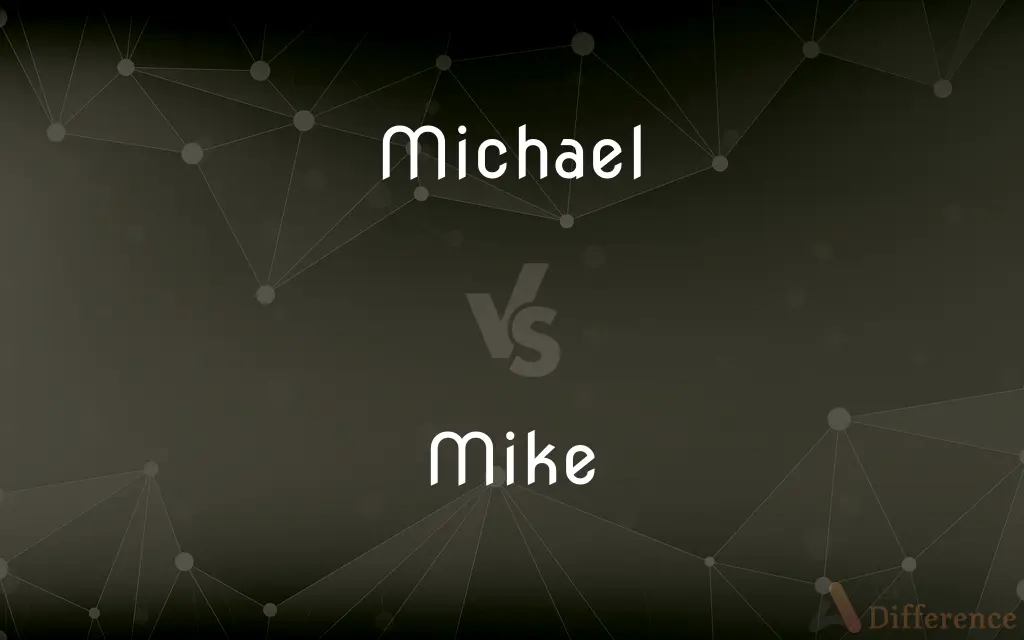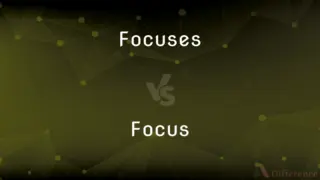Michael vs. Mike — What's the Difference?
Edited by Tayyaba Rehman — By Fiza Rafique — Updated on October 25, 2023
Michael is a full given name; Mike is its common diminutive or nickname.

Difference Between Michael and Mike
Table of Contents
ADVERTISEMENT
Key Differences
Michael is a traditional male name with Biblical origins, stemming from the Hebrew name Mikha'el, which means "Who is like God?". On the other hand, Mike is a diminutive form of Michael and serves as a more informal or affectionate version of the name.
While Michael carries with it a sense of formality and might be used in official documents or formal introductions, Mike offers a sense of familiarity, often used among friends, family, or peers. Both Michael and Mike, however, refer to the same individual, and it's up to personal preference as to which version is used and when.
For instance, a person named Michael might introduce himself as Mike in a casual setting but use Michael in a professional context. Though both Michael and Mike are intrinsically linked, their usage can convey different degrees of intimacy or formality, depending on the context.
Comparison Chart
Form
Full name
Diminutive/nickname
Origins
Hebrew
Derived from Michael
ADVERTISEMENT
Connotation
Formal
Informal/Familiar
Usage
Official documents, formal settings
Casual settings, among friends
Length
Longer (7 letters)
Shorter (4 letters)
Compare with Definitions
Michael
A name often used in religious contexts.
Many saints were named Michael.
Mike
An informal version of Michael.
Mike is a common name in everyday conversations.
Michael
A male given name of Hebrew origin.
Michael is one of the archangels in the Bible.
Mike
A short form often used in casual contexts.
Mike, can you pass the salt?
Michael
A common first name in many cultures.
Michael is a popular name in the United States.
Mike
A diminutive that indicates familiarity.
Only his close friends call him Mike.
Michael
A name meaning "Who is like God?".
The name Michael has spiritual significance for many.
Mike
A name often used in spoken language over written.
He signs his emails as Mike.
Michael
A formal version of the name Mike.
He introduced himself as Michael during the interview.
Mike
Mike is a masculine given name. It is also encountered as an abbreviation or shorthand for Michael or microphone.
Michael
Michael is a masculine given name derived from the Hebrew phrase מי כאל mī kāʼēl, 'Who [is] like-El', in Aramaic: ܡܝܟܐܝܠ (Mīkhāʼēl [miχaˈʔel]). The theophoric name is a rhetorical question – "Who [is] like [the Hebrew God] El?", whose answer is "there is none like El", or "there is none as famous and powerful as God." This question is known in Latin as Quis ut Deus?.
Mike
A code word representing the letter M, used in radio communication.
Michael
An archangel who appears in the Hebrew Scriptures as a protector of the Jews and in the New Testament as a leader of the angels in their war against Satan.
Mike
Supply or equip with a microphone
The minister was already miked up for the interview
Michael
(Old Testament) the guardian archangel of the Jews
Mike
Idle away one's time
He thundered at anyone he thought was miking
Mike
A microphone.
Mike
To supply with or transmit through a microphone.
Mike
(informal) A microphone.
Mike
(international standards) nodot=1 NATO/ICAO Phonetic Alphabet.}}
Mike
A minute.
We'll be there in one zero mikes [i.e. ten minutes].
Mike
To microphone; to place one or more microphones (mikes) on.
Mike
To measure using a micrometer.
Mike
A microphone, the device for converting sound waves into electrical energy.
Mike
Device for converting sound waves into electrical energy
Mike
A nickname for Michael.
His friends call him Mike for short.
Common Curiosities
Can Michael be used for females?
While traditionally male, there are variations like "Michaela" for females.
Are there other nicknames for Michael?
Yes, "Mickey" or "Mikey" can also be nicknames for Michael.
Why might someone prefer Mike over Michael?
Mike offers a sense of familiarity and is shorter and more informal.
What does Michael mean?
Michael is a Hebrew name meaning "Who is like God?".
Is Mike a standalone name?
Typically, Mike is a diminutive of Michael, but it can be used as a standalone name.
How did Mike become a nickname for Michael?
It's a common practice to shorten names, and "Mike" is a natural abbreviation of Michael.
When is it appropriate to use Michael over Mike?
Michael is more formal and might be used in official documents or formal settings, while Mike is casual.
Is Michael a popular name?
Yes, Michael has been a popular name in many countries for years.
Does Mike have other meanings besides being a name?
Yes, "mike" can also refer to a microphone.
How old is the name Michael?
Michael is an ancient name with Biblical origins.
Is the pronunciation of Michael and Mike different globally?
Yes, pronunciation can vary based on language and region.
Is the spelling of Mike consistent worldwide?
Mostly, but there can be variations like "Mik" in some regions.
Is it impolite to call someone Mike if their name is Michael without asking?
It's always best to ask someone's preference, as some might prefer the full form.
Can you use Mike in formal writing?
It's best to use the full name, Michael, in formal writing unless you know the person prefers "Mike".
Are Michael and Mike used in other languages?
Yes, variations and pronunciations of Michael and Mike exist in many languages.
Share Your Discovery

Previous Comparison
Dolphin vs. Porpoise
Next Comparison
Focuses vs. FocusAuthor Spotlight
Written by
Fiza RafiqueFiza Rafique is a skilled content writer at AskDifference.com, where she meticulously refines and enhances written pieces. Drawing from her vast editorial expertise, Fiza ensures clarity, accuracy, and precision in every article. Passionate about language, she continually seeks to elevate the quality of content for readers worldwide.
Edited by
Tayyaba RehmanTayyaba Rehman is a distinguished writer, currently serving as a primary contributor to askdifference.com. As a researcher in semantics and etymology, Tayyaba's passion for the complexity of languages and their distinctions has found a perfect home on the platform. Tayyaba delves into the intricacies of language, distinguishing between commonly confused words and phrases, thereby providing clarity for readers worldwide.
















































